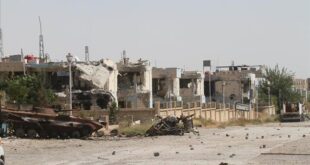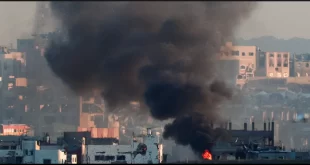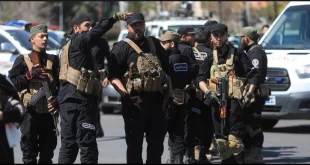Jan 22, 2015, Al-Akhbar
While the numbers of sick and wounded have increased during the Syrian war, the number of available doctors dropped significantly due to the security situation and immigration. The economic blockade has also had a major impact on the availability of medicines and medical equipment.
Damascus In front of Ibn al-Nafis public hospital in the Rukh al-Din neighborhood of Damascus, a large number of patients and their families wait for their turn. Everybody here — doctors, staff, and patients — complains about the number of patients, which far exceeds the hospital’s capacity.
“These patients were supposed to be distributed among dozens of public hospitals and medical centers and clinics in the country,” one of the doctors tells Al-Akhbar.“Most patients come from tense areas, such as al-Hasakah, Deir Ezzor, Raqqa, Aleppo, Idlib, and the Hama countryside, which do not offer any medical services.” The doctor says that, with the exception of emergency operations, there are almost no medical services in most of the country’s provinces. “The capital has become the last place to seek treatment. It is handling the patient load of at least 10 provinces,” he adds.
The patients at Ibn al-Nafis hospital are not in a better condition. While waiting his turn for a follow-up at one of the hospital’s clinics, a man in his fifties from al-Hasakah tells Al-Akhbar: “There is no land route between Damascus and al-Hasakah. We are forced to come here by plane, which means additional costs.” But these are not the only problems. “Flights to the capital are not always available, and patients are required to book an appointment at the clinic before receiving treatment, which sometimes takes up to two weeks. So patients may have to spend the treatment period in hotels or with relatives.”
Figures released by the Syrian Ministry of Health have shown an unprecedented deterioration in the medical sector. A source from the ministry tells Al-Akhbar: “The ministry does not exercise any role in areas that are not under the control of the state. In other areas, except for the capital, medical services in all specialties have declined, except emergency medicine. The capital is the main provider of medical services in various specialties.”
The source adds that in the city of Aleppo, for example, the number of available doctors has dropped from “40,000 to just 2,000.” The Ministry of Health does not have detailed information about these doctors. According to the source, “the majority of doctors left the country. The segment of doctors was one of the affluent segments of society, but it was subjected to risks of abduction and extortion. Part of them stayed in areas that are outside the control of the state, and others fled to the capital.”
According to the source, “a considerable part of the medical body is now under military supervision due to its critical and important role to the army. The Red Crescent and relief medical organizations are also playing a role along with the traditional medical sector, represented by the Ministry of Health.”
There is also an urgent need for doctors with rare specializations. “For example, there are only a few endocrinologists in the country, while there is an acute shortage of doctors specialized in heart transplantation, cardiology, and all kinds of surgery.”
At the same time, the economic blockade has taken its toll on the medical sector, in terms of the provision of medical equipment, medicines, and medical accessories (surgical instruments).
According to Ibrahim Hanna, a general surgery specialist, “no medical equipment has been imported in the past few years for any medical specializations. But this is not the only problem. Equipment at hospitals used to be available before the war. There is a need to import spare parts and repair hospital equipments, many of which have become out of service.”
As for medical “accessories,” the general surgery specialist says that “prices have almost doubled. For example, the cost of a cardiac catheterization surgery has risen from 300,000 Syrian liras at the beginning of the crisis to one million (about $5,000), due to the increase of the price of catheters, which are often secured by the families of patients from Lebanon.”
However, the pharmaceutical sector appears to be more stable than other sectors, which Hanna attributes to “the advanced and well-established pharmaceutical industry in the country for decades, which made of Syria a major exporter of medicine at the regional level in previous years.”
Hanna believes that the main problem in the pharmaceutical sector is the difficulty to secure medicines that are not manufactured locally, such as expensive cancer drugs. He says that “the government used to offer them to patients almost for free, but it stopped after the economic blockade. Now, the patients have to obtain these medicines at higher prices from drug smugglers, or give in to death.”
 Syria Support Movement solidarity with the Syrian people
Syria Support Movement solidarity with the Syrian people




